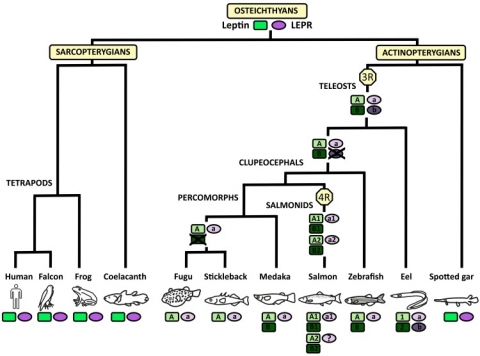
Duplicated leptin receptors in two species of eel bring new insights into the evolution of the leptin system in vertebrates
Marina Morini, Jérémy Pasquier, Ron Dirks, Guido van den Thillart, Jonna Tomkiewicz, Karine Rousseau, Sylvie Dufour, and Anne-Gaëlle Lafont
PLoS ONE 10(5): e0126008. doi:10.1371/journal.pone.0126008
Leptin has been discovered in mammals as a key-hormone in metabolism. Mutation in the leptin gene, or in the leptin receptor gene LEPR, induces severe obesity in human, concomitant with multiple hormonal alterations, particularly in relation with reproduction. In the eel, metabolism and reproduction are closely connected. During their life cycle, eels accumulate metabolic stores during the growth phase in continental waters, stop feeding at the pre-pubertal stage, and fast during the reproductive oceanic migration. Their metabolic stores will be mobilized to perform both the long oceanic journey and the sexual maturation.
In this study, we characterized two leptin genes in the European and Japanese eels, Anguilla Anguilla and Anguilla japonica, as in most other teleost species, and reported, for the first time in vertebrates, the presence of two leptin receptor genes. In teleosts, the leptin system would have been duplicated through the teleost-specific third whole genome duplication event (3R). Although most teleosts possess two leptins, the eel represents, among extant vertebrates, a unique case of duplicated leptins and leptin receptors as a result of 3R.
We proceeded with sexual maturation experiments, and demonstrated the involvement of the leptin system in the European eel reproduction. This system seems to play in the eel a crucial role in the mobilization of energy storage during the reproductive oceanic migration. This study suggests an ancient role of the leptin system in the interactions between metabolism and reproduction in vertebrates.
This study was conducted by the team 2 of BOREA, in collaboration with Dutch and Danish teams, in the frame of the international project “Eel genome” and the European project PROEEL “Reproduction of European eel: towards a self-sustained aquaculture”.
BOREA contact : Anne-Gaelle Lafont : lafont@mnhn.fr
